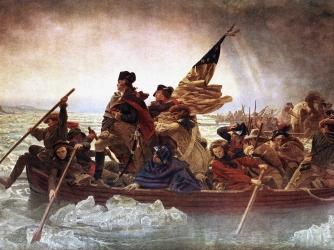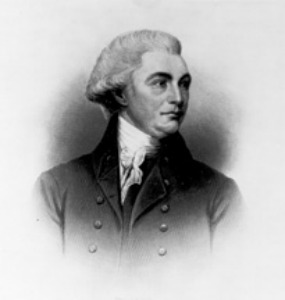Related Topics
Revolution in New Jersey
Early, brief but significant.
Privateering, War Supplies, and Inflation

|
| The Battle of Trenton |
Embattled soldiers have always picked up the weapons of the fallen enemy. In the Revolutionary War, however, other sources of supply were so limited, and the number of captured enemy ships so large, that privateering was an unusually large source of supplies for Washington's army. At the Battle of Trenton, Washington was only able to attack the Hessians because of a single lucky supply ship arriving in Philadelphia. The famous cannons captured at Ticonderoga and dragged to the rescue of Boston were mounted on the overlooking bluff and frightened the British warships away from the harbor. But the cannons were Washington's bluff indeed; he lacked gunpowder to fire them.

|
| William Bingham |
During 1777 however, William Bingham's captured prizes from the Caribbean and privateers commissioned and built in the New Jersey pine barrens, inflicted serious harm on British shipping. During one year it was estimated that 800 British ships were captured; one British spy reported he counted over 80 prizes in the harbor of Martinique on one day. Of course, these battles consumed gunpowder, lost ships with all hands, and sometimes had very little gunpowder on board, to begin with. Nevertheless, the huge volume of captured shipping, in a day when most ships carried some guns, led to this activity becoming a major source of war supplies to the pitifully underarmed Patriots.
From a different viewpoint, the system of sharing the booty with the crew of the victorious privateer led to sudden enrichment of the woodsmen and farm boys who sailed on the Predator fleet. This presented serious competition for recruiting the Continental Army and spread pockets of general inflation when the exuberant sailors reached home port. Ultimately, all of these commotions caused serious problems for Robert Morris and others who were responsible for recruiting and paying soldiers, as well as keeping the economy running. Naturally, the merchants and farmers would prefer to sell to the navy, tattered though it might have been, rather than to the army which would as likely commandeer what they needed, as pay for it.
Originally published: Friday, April 08, 2011; most-recently modified: Monday, June 03, 2019
| Posted by: Nerice | May 1, 2011 6:12 PM |
| Posted by: Nash | Apr 22, 2011 6:06 PM |